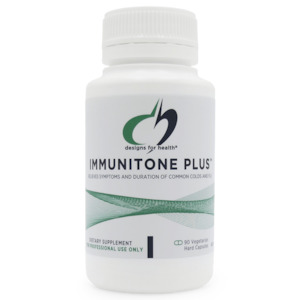DFH Immunitone Plus 90

- Comprehensive herbal and nutritional immune support
- Contains Elderberry, Andrographis, and Echinacea
- Features traditional Mushrooms, and Zinc
- Supports immune system health and function
- Relieve symptoms of the common colds and flu.
- Reduces the duration of the common cold
- Vegan Friendly
Healthy immunity requires an appropriate, integrated response to infections by the complex combination of cells, tissues and organs that comprise the immune system. The internal presence of a pathogen (bacteria, viruses, fungi) initially activates the non-specific mechanisms of the innate immune system to attempt infection elimination. If not cleared by the innate immune response, a range of specific functional mechanisms of the adaptive immune system (involving B and T cells) are mobilised to remove the infectious pathogen.Upper respiratory tract infections (URTI’s) are highly prevalent and considered to be a significant health concern for both generally healthy and immune-compromised population groups. Exposure to a complex combination of endogenous (host) and exogenous factors can impair the immune system’s capacity to respond effectively. This results in pathogenic (bacterial, viral) attachment and colonisation to upper respiratory mucosa and the subsequent onset of infection (rhinitis, pharyngitis, laryngitis) and its associated symptoms (cough, sore throat, runny nose, nasal congestion, headache, fever, sneezing). Overall, the evidence demonstrates that healthy immunity requires a multifaceted approach including minimising exposure to all modifiable factors In addition, particular therapeutic nutrients and herbs have been shown to benefit immune system via a range of mechanisms.
Andrographis
Andrographis has been used in Traditional Chinese Medicine (TCM) for centuries. Clinical investigations attribute its therapeutic benefits primarily to the andrographolides constituent. A broad range of human clinical studies and meta-analyses have confirmed that Andrographis effectively reduces symptoms associated with acute respiratory tract infections. Mechanisms responsible for these therapeutic effects include significant antibacterial, antiviral, anti-inflammatory and antioxidant activity along with modulation of innate and adaptive immune function.
Echinacea
Echinacea has a long history of use in traditional Native American medicine and by Eclectic physicians for a range of medicinal purposes. Considered to have immune-modulating, depurative, anti-inflammatory actions, the main active components are the poly saccharides, caffeic acid derivatives, alkylamides (alkamides), phenolics and terpenes. The well-established benefits of echinacea for supporting innate and adaptive immune function are based on multiple mechanisms including antiviral, antibacterial, antioxidant, anti-inflammatory effects. It also promotes immune cell proliferation and activity (natural killer, dendritic, monocyte and T-cells) and modulates the gastrointestinal microbiome.
Astragalus
Astragalus is one of the oldest herbs recorded and used within the traditional Chinese medicinal paradigm. The primary active constituents are considered to be the saponins, flavonoids and polysaccharides. They support immune function via multiple mechanisms including regulating immune cell signalling, proliferation and activity (B- and T-lymphocytes, macrophages, natural killer and dendritic cells) and immunoglobulin secretion and modulating the gastrointestinal microbiome. Astragalus also has antiviral (modulating cell proliferation and cellular superoxide dismutase and malonaldehyde concentrations) and antibacterial activity.
Elderberry
Demonstrated to reduce upper respiratory symptoms associated with the common cold, elderberry supports immunity via antioxidant, antiviral (blocks viral capacity to infect host cells), antibacterial and immune-stimulating mechanisms (promotes immune cell synthesis of pro- IL-1 beta, TNF-alpha, IL-6, IL-8 and anti-inflammatory cytokines (IL-10).
Medicinal Mushrooms (Cordyceps, Shitake, Maitake and Reishi)
Medicinal mushrooms cordyceps, shiitake, maitake and reishi have a long history of use in TCM for their significant health-giving properties. These effects have been confirmed by extensive in vitro and in vivo investigations demonstrating the underlying immune-modulatory mechanisms.
Cordyceps has been shown to regulate inflammation (cytokine and chemokine release and inflammatory signalling), promote immune cell proliferation and activity and increase gastrointestinal secretory immunoglobulin (sIgA) secretion.
Lentinula has also been shown to support both innate and adaptive i
